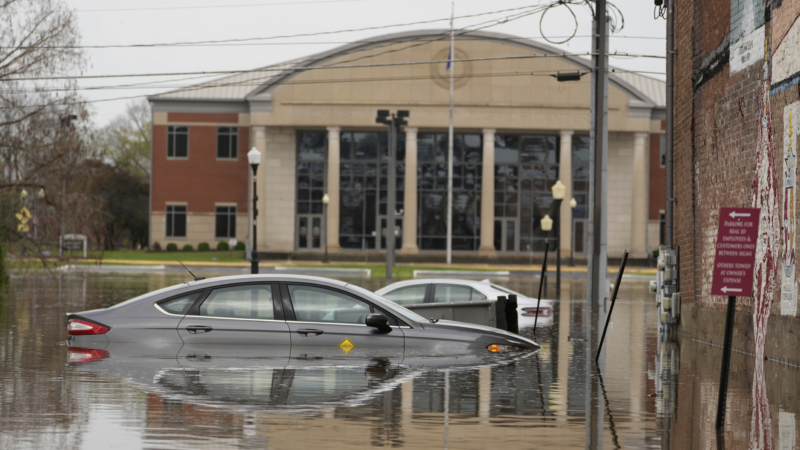Alabama Reacts to New Obama Immigration Policy
Alabama Reacts to New Obama Immigration Policy
When President Obama announced last week that hundreds of thousands of immigrants who came to the U.S. illegally as children can now obtain work permits and be safe from deportation, immigrants across the country celebrated. In Alabama, home to the nation’s toughest illegal immigration law, the new policy opens doors for many young people, but doesn’t answer all the questions, as Tanya Ott reports.
A mile down a dirt road – dotted with mobile homes, dogs chained in the front yards – there’s a small immaculately kept yellow house. Inside, a family whose life has been turned upside down in the last week.
The window AC unit drones. The lights are dim. An effort to keep the house cool in the Alabama summer. But you can’t help thinking it’s also an effort to keep a low profile. Afterall, the Doroteo family has been in hiding for the 13 years since they slipped across the border from Mexico. Carlos was 11 at the time.
“We paid somebody for bring us in here across the river. You feel afraid. Anything go wrong you could of drown and being so young you don’t know how to swim”
 Doroteo also didn’t know he’d be illegal in the U-S. Still, he thrived in Alabama. He learned English and was a high school football star. But when he graduated it all came to a halt.
Doroteo also didn’t know he’d be illegal in the U-S. Still, he thrived in Alabama. He learned English and was a high school football star. But when he graduated it all came to a halt.
“Since I don’t have a social security card or ID, stuff like that, I’ve been doing construction work since I graduated.”
Last week, a cop pulled Doroteo over for a traffic violation. When he couldn’t show a drivers’ license, Doroteo was arrested. He was terrified he’d be deported.
“Most of my life I’ve been over here. It would have been real bad for me because wouldn’t know what to do or what to expect once I get over there.”
He was released with a warning after four days.
Then, President Obama made the announcement. The new immigration policy applies to people who are under 30 years old, arrived in the U-S before they turned 16 and have lived here at least 5 years. They must have no criminal record and either be in school, a high school graduate or serving in the military.
Mary Bauer of the Southern Poverty Law Center says it’s an important step, but a small step because it doesn’t provide a permanent solution.
“Living here in Alabama it doesn’t provide a full measure of protection from our anti-immigrant law, so people are still theoretically subject to being arrested or detained under Alabama’s law.”
State Senator Scott Beason sponsored that law. He worries about how the new federal policy will affect Alabama’s law. He also believes the new federal policy will be hard to enforce.
“How do you decide were they really brought here when they were six or were they 17? How old are they really? I really think the purpose is to begin to have amnesty across the board.”
Full amnesty would be fine with Carlos Doroteo. But he’s not dreaming that big right now. He just wants a job that’s not as back breaking as construction so he can build a better life for himself and his family.
Florida heads to NCAA title game in a victory over SEC rival Auburn
Florida beat Southeastern Conference rival Auburn 79-73 in the Final Four on Saturday night. The Gators are going to the national championship game for the first time since their titles in 2006 and 2007.
How automakers are responding to the 25% car tariffs so far
It's only been a few days since President Trump's 25% tariffs on foreign cars took effect. But the import surcharge has led to some immediate changes, including layoffs and pauses in car shipments.
Nationwide ‘Hands Off’ protests erupt against Trump and Musk
Demonstrations took place across the country, uniting a myriad of criticisms of the Trump administration under one message: "Hands off."
How automakers are responding to the 25% car tariffs so far
It's only been a few days since President Trump's 25% tariffs on foreign cars took effect. But the import surcharge has led to some immediate changes, including layoffs and pauses in car shipments.
‘Oliver and Amanda Pig’ series author Jean Van Leeuwen dies at 87
The children's book author best known for her Oliver and Amanda Pig series has died at 87. Van Leeuwen wrote nearly 60 books, some of which sold millions of copies.
More torrential rain and flash flooding are expected in waterlogged South and Midwest
Another round of torrential rain and flash flooding was coming Saturday for parts of the South and Midwest already heavily waterlogged by days of severe storms that also spawned some deadly tornadoes.







